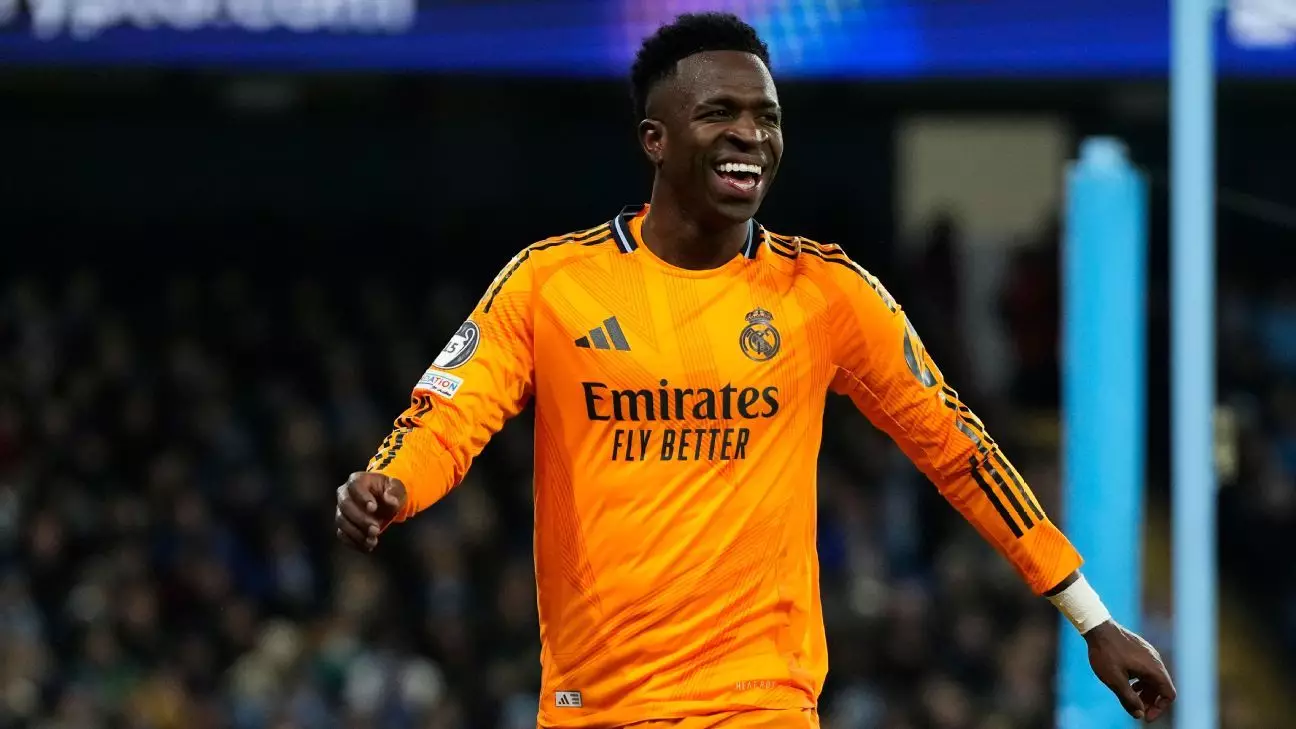In the world of football, it is common for player transfer rumors to create distractions, particularly when high-profile clubs are involved. Currently, Vinícius Júnior, the Brazilian forward for Real Madrid, finds himself at the center of speculation linking him to a move to the lucrative Saudi Arabian league. Despite the intense media focus on this topic, Real Madrid’s coach, Carlo Ancelotti, has downplayed these rumors, asserting that his focus remains steadfast on the team’s performance and unity. Ancelotti’s indifference to this speculation exemplifies a broader perspective on the nature of player movement in modern football—a realm often characterized by exaggerated narratives and misplaced priorities.
During a recent press conference, Ancelotti expressed fatigue regarding questions about Vinícius’ potential transfer. “Yes, I’m tired of this topic but I’m not worried,” he stated, emphasizing that his player appears content within the club. This assertion reflects a strong position within Madrid’s coaching staff, suggesting that the atmosphere surrounding the team is one of stability rather than turmoil.
Vinícius himself has dismissed speculations about leaving the club, expressing a desire to extend his contract beyond 2027. His commitment to Real Madrid is evident not only in his words but also in his on-field performances. In a recent Champions League match against Manchester City, he delivered a stellar performance, recording two assists and proving his value to the team despite not scoring. His play was critically acclaimed, earning him the title of Player of the Match and illustrating his capability to handle the pressure in significant games.
The forward’s connection with the fans has only strengthened over the years; during his seventh season at Madrid, Vinícius has been instrumental in winning numerous titles, including two Champions League trophies and three LaLiga championships. This legacy contributes to his hefty demands—a reflection of his standing within the team and his desire for equity within the club’s wage structure.
Reports indicate that Vinícius’ agents have conveyed demands for increased pay, insisting on compensation that surpasses that of the club’s current highest earner, Kylian Mbappé. While Vinícius recently received a significant bonus after his nomination for The Best FIFA Men’s Player award, the financial negotiations highlight the growing disparities within football salaries and the evolution of players as marketable assets. Ancelotti’s commentary on this situation suggests an acknowledgment of Vinícius’ worth, yet it also reflects concern about the sustainable management of financial resources in an increasingly competitive landscape.
As Ancelotti noted, Real Madrid’s objectives extend beyond immediate financial considerations; they seek to retain Vinícius not just for his talent but for his potential to contribute to the club’s ongoing legacy. The balance between meeting player expectations and maintaining prudent financial management remains a challenging dynamic for club officials.
One interesting angle in this narrative is the shifting dynamics within global football markets. Ancelotti commented on the potential future competitiveness of leagues like Saudi Arabia’s, noting, “It shouldn’t surprise us that a country wants to invest in football.” This statement signifies a recognition of the evolving nature of football beyond traditional powerhouses in Europe. As countries like Saudi Arabia prepare for significant international events such as the 2034 World Cup, their investment in sports reflects an ambition to enhance their global standing.
While the Saudi Pro League may not currently match European leagues in terms of prestige and competitiveness, the landscape is changing. It poses questions about the future of player transfers and how financial power can reshape career decisions for athletes today. Ancelotti’s openness to coaching in such leagues underscores a potential shift in career trajectories for seasoned coaches and players alike.
With a contract extending until 2026, Ancelotti remains focused on addressing the immediate challenges before him. Real Madrid’s ongoing campaign requires them to capitalize on their successes, especially ahead of crucial matches against teams like Osasuna and Manchester City. Maintaining momentum is critical as the Madrid side seeks to uphold their position at the top of the LaLiga table while also advancing in the Champions League.
The future of Vinícius Júnior within Real Madrid may be shrouded in speculation, but the focus remains on performance and team cohesion. The intertwining narratives of contract negotiations and rising international leagues will shape not just Vinícius’ path but the broader landscape of football as it evolves in the years to come.

